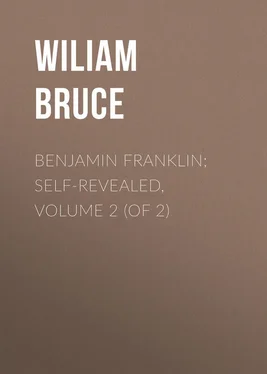Wiliam Bruce - Benjamin Franklin; Self-Revealed, Volume 2 (of 2)
Здесь есть возможность читать онлайн «Wiliam Bruce - Benjamin Franklin; Self-Revealed, Volume 2 (of 2)» — ознакомительный отрывок электронной книги совершенно бесплатно, а после прочтения отрывка купить полную версию. В некоторых случаях можно слушать аудио, скачать через торрент в формате fb2 и присутствует краткое содержание. Жанр: foreign_antique, foreign_prose, на английском языке. Описание произведения, (предисловие) а так же отзывы посетителей доступны на портале библиотеки ЛибКат.
- Название:Benjamin Franklin; Self-Revealed, Volume 2 (of 2)
- Автор:
- Жанр:
- Год:неизвестен
- ISBN:нет данных
- Рейтинг книги:4 / 5. Голосов: 1
-
Избранное:Добавить в избранное
- Отзывы:
-
Ваша оценка:
- 80
- 1
- 2
- 3
- 4
- 5
Benjamin Franklin; Self-Revealed, Volume 2 (of 2): краткое содержание, описание и аннотация
Предлагаем к чтению аннотацию, описание, краткое содержание или предисловие (зависит от того, что написал сам автор книги «Benjamin Franklin; Self-Revealed, Volume 2 (of 2)»). Если вы не нашли необходимую информацию о книге — напишите в комментариях, мы постараемся отыскать её.
Benjamin Franklin; Self-Revealed, Volume 2 (of 2) — читать онлайн ознакомительный отрывок
Ниже представлен текст книги, разбитый по страницам. Система сохранения места последней прочитанной страницы, позволяет с удобством читать онлайн бесплатно книгу «Benjamin Franklin; Self-Revealed, Volume 2 (of 2)», без необходимости каждый раз заново искать на чём Вы остановились. Поставьте закладку, и сможете в любой момент перейти на страницу, на которой закончили чтение.
Интервал:
Закладка:
It was impossible for such an irrational thing as the duel to escape Franklin's humorous insight, and a story like the following tended far more effectively to end the superstition upon which it throve than any pains or penalties that law could devise:
A Man [wrote Franklin from Passy to Thomas Percival] says something, which another tells him is a Lie. They fight; but, whichever is killed, the Point in dispute remains unsettled. To this purpose they have a pleasant little Story here. A Gentleman in a Coffee-house desired another to sit farther from him. "Why so?" "Because, Sir, you stink." "That is an Affront, and you must fight me." "I will fight you, if you insist upon it; but I do not see how that will mend the Matter. For if you kill me, I shall stink too; and if I kill you, (you) will stink, if possible, worse than you do at present."
This is one of those stories which make their own application, but the grave reflections, by which it was followed, are well worthy of quotation too.
How can such miserable Sinners as we are [added Franklin] entertain so much Pride, as to conceit that every Offence against our imagined Honour merits Death ? These petty Princes in their own Opinion would call that Sovereign a Tyrant, who should put one of them to death for a little uncivil Language, tho' pointed at his sacred Person; yet every one of them makes himself Judge in his own Cause, condemns the offender without a Jury, and undertakes himself to be the Executioner.
Some bon mots , too, of Franklin have come down to us with his stories. When a neighbor of his in Philadelphia consulted him as to how he could keep trespassers from coming into his back yard, and stealing small beer from a keg, which he kept there, he replied, "Put a pipe of Madeira alongside of it." When Lord Stormont, the British Ambassador to France, hatched the report that a large part of Washington's army had surrendered, Franklin was asked whether it was true. "No sir," he said, "it is not a truth, it is only a stormont." The result was that for some time no lies were told in Paris but only "stormonts." It was not often that the wit of Franklin was barbed with malice, but there were good reasons why the malice in this instance should never have cost him any regret. When the American Commissioners proposed an exchange of prisoners to Lord Stormont, he did not deign to reply, but when they followed up their proposition with another letter, he returned a communication to them without date or signature in these insolent words: "The King's Ambassador receives no letters from rebels but when they come to implore his Majesty's mercy." The American Commissioners, with Franklin doubtless as their scrivener, were quite equal to the occasion. "In answer to a letter which concerns some of the most material interests of humanity, and of the two nations, Great Britain and the United States of America, now at war," they retorted, "we received the inclosed indecent paper, as coming from your lordship, which we return, for your lordship's more mature consideration." Between Franklin and the vivacity of the Parisians, Lord Stormont found it not a little difficult to maintain his position of frigid and relentless dignity. Commenting in a letter to John Lovell, after Lord Stormont had left France, upon the expense entailed upon the United States by supernumerary commissioners, Franklin takes this parting shot at the Ambassador; we reduce such of his words as were in French to English:
I imagine every one of us spends nearly as much as Lord Stormont did. It is true, he left behind him the character of a niggard; and, when the advertisement appeared for the sale of his household goods, all Paris laughed at an article of it, perhaps very innocently expressed, "a great quantity of table linen, which has never been used." "That is very true," say they, "for he has never given any one anything to eat." 4
Another bon mot of Franklin was his reply when he was told that Howe had taken Philadelphia. "No," he said, "Philadelphia has taken Howe"; and so it proved. Still another owed its origin to the balloon in its infancy. "Of what use is a balloon?" someone asked in Franklin's presence. "Of what use," he answered, "is a new-born baby?"
But to form a correct impression of Franklin's humor we should think of it, to use Dr. Cutler's comparison, as something as natural to him as the rise and fall of his chest in breathing. It played like an iris over the commonest transactions of his life. If it was only a lost prayer book of his wife that he was advertising for in his Gazette , he did it in such terms as these:
Taken out of a Pew in the Church some months since, a Common Prayer-Book, bound in Red, gilt, and letter'd D. F. on each corner. The Person who took it is desir'd to open it, and read the Eighth Commandment, and afterwards return it to the same Pew again; upon which no further Notice will be taken.
At times, the humor is mere waggishness. When he was the Colonial Deputy Postmaster-General, he indorsed his letters, "Free, B. Franklin," but, after he became the Postmaster-General of the United States, out of deference for the American struggle for liberty, he changed the indorsement to "B. Free Franklin." Even in his brief memoranda on the backs of letters, there are gleams of the same overflowing vivacity. Upon the manuscript of a long poem, received by him, when in France, he jotted down the words: "From M. de Raudiere, a poor Poet, who craves assistance to enable him to finish an epic poem which he is writing against the English. He thinks General Howe will be off as soon as the poem appears." When a Benedictine monk, the prior for a time of the Abbey of St. Pierre de Chalon, lost money at cards, and wrote to him for his aid, he made this endorsement upon the letter: "Dom Bernard, Benedictine, wants me to pay his Gaming Debts – and he will pray for success to our Cause!"
The humor of Franklin was too broad at times not to find expression occasionally in practical jokes. When in England, during his maturer years, he was in the habit of pretending to read his Parable against Persecution, which he had learnt by heart, and in which the manner of the Old Testament is skilfully imitated, out of his Bible, as the fifty-first Chapter of the Book of Genesis. The remarks of the Scripturians on it, he said in a letter written by him a year before his death, were sometimes very diverting. On one occasion, he wrote to the famous English printer, John Baskerville, that, to test the acumen of a connoisseur, who had asserted that Baskerville would blind all the readers of the nation by the thin and narrow strokes of his letters, he submitted to the inspection of the gentleman, as a specimen of Baskerville's printing, what was in reality a fragment of a page printed by Caslon. Franklin protested that he could not for his life see in what respects the print merited the gentleman's criticism. The gentleman saw in it everywhere illustrations of the justice of this criticism and declared that he could not even then read the specimen without pain in his eyes.
I spared him that Time [said Franklin] the Confusion of being told, that these were the Types he had been reading all his life, with so much Ease to his Eyes; the Types his adored Newton is printed with, on which he has pored not a little; nay, the very Types his own Book is printed with, (for he is himself an Author) and yet never discovered this painful Disproportion in them, till he thought they were yours. 5
Associated with these moral and intellectual traits was a total lack of all anti-social characteristics or habits. When Franklin was in his twenty-first year, he made this sage entry in his Journal of his voyage from London to Philadelphia:
Man is a sociable being, and it is, for aught I know, one of the worst of punishments to be excluded from Society. I have read abundance of fine things on the subject of solitude, and I know 'tis a common boast in the mouths of those that affect to be thought wise, that they are never less alone than when alone . I acknowledge solitude an agreeable refreshment to a busy mind; but were these thinking people obliged to be always alone, I am apt to think they would quickly find their very being insupportable to them.
Читать дальшеИнтервал:
Закладка:
Похожие книги на «Benjamin Franklin; Self-Revealed, Volume 2 (of 2)»
Представляем Вашему вниманию похожие книги на «Benjamin Franklin; Self-Revealed, Volume 2 (of 2)» списком для выбора. Мы отобрали схожую по названию и смыслу литературу в надежде предоставить читателям больше вариантов отыскать новые, интересные, ещё непрочитанные произведения.
Обсуждение, отзывы о книге «Benjamin Franklin; Self-Revealed, Volume 2 (of 2)» и просто собственные мнения читателей. Оставьте ваши комментарии, напишите, что Вы думаете о произведении, его смысле или главных героях. Укажите что конкретно понравилось, а что нет, и почему Вы так считаете.










![Benjamin Franklin - Memoirs of Benjamin Franklin; Written by Himself. [Vol. 2 of 2]](/books/747975/benjamin-franklin-memoirs-of-benjamin-franklin-wr-thumb.webp)
![Benjamin Franklin - Memoirs of Benjamin Franklin; Written by Himself. [Vol. 1 of 2]](/books/748053/benjamin-franklin-memoirs-of-benjamin-franklin-wr-thumb.webp)
